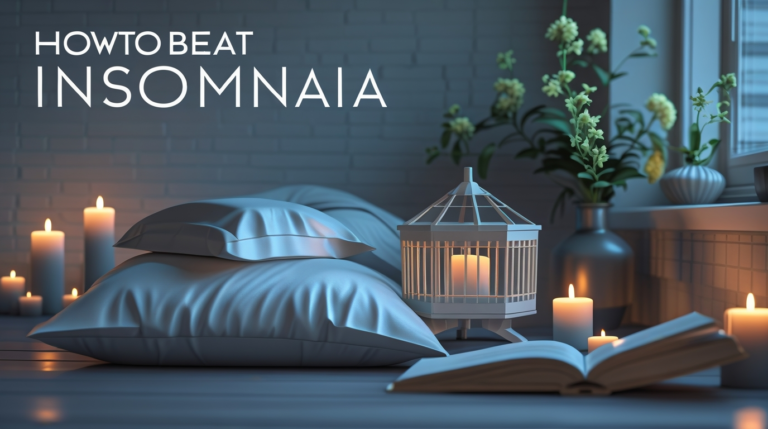Millions of people around the world struggle with insomnia, a sleep disorder characterized by difficulty falling asleep, staying asleep, or waking up too early and not being able to go back to sleep. Consequently, they often feel fatigued and unrefreshed upon waking, leading to a ripple effect of challenges in daily functioning. For many sufferers, beating insomnia without resorting to medication is a top priority. While medication can provide temporary relief, non-pharmacological strategies are essential for sustainable, long-term improvements in sleep quality. They not only help alleviate insomnia but also contribute to overall well-being. In this post, we’ll explore how to beat insomnia naturally, providing you with effective, evidence-based techniques. Let’s dive in!
Understanding Insomnia: What Causes It?
The Science of Sleep
Insomnia is deeply rooted in our sleep-wake cycle, often influenced by both psychological and physiological factors. The human body operates on a circadian rhythm, a natural internal clock that regulates sleep cycles. Disruptions in this cycle can lead to insomnia. Stress, anxiety, depression, and lifestyle habits are some of the primary contributors to sleep disturbances.
Common Triggers and Risk Factors
Some of the common triggers include stress from work or personal life, changes in schedules, poor sleep hygiene, and chronic pain. Risk factors can also encompass a family history of insomnia, advanced age, and poor mental health.
Non-Medication Strategies to Beat Insomnia
Improving Sleep Hygiene: The Foundation
Sleep hygiene involves practices that promote consistent, uninterrupted sleep. Key techniques include:
- Maintaining a regular sleep schedule by going to bed and waking up at the same time each day.
- Creating a comfortable sleep environment, keeping your bedroom dark, quiet, and cool.
- Limiting exposure to screens before bed as blue light can interfere with the production of melatonin.
- Avoiding caffeine and heavy meals in the hours leading up to bedtime.
Mindfulness and Relaxation Techniques
Incorporating mindfulness and relaxation exercises can be highly beneficial in managing insomnia. Practices such as deep breathing, progressive muscle relaxation, and meditation can help reduce stress and promote a state of calm conducive to sleep. Listening to soothing music or using a white-noise machine can also enhance your ability to fall asleep.
Adopt a Healthier Lifestyle
Physical Activity and Its Impact
Regular exercise is a critical component of a healthy sleep regimen. Engaging in physical activity during the day can help you fall asleep quicker and enjoy deeper sleep stages. However, it is crucial to avoid vigorous exercise close to bedtime as it may have a stimulating effect.
Diet and Sleep: What to Eat and Avoid
Your diet significantly affects your sleep quality. Consuming a balanced diet rich in whole grains, fruits, vegetables, and lean proteins can help regulate mood and stress levels, indirectly aiding better sleep. Conversely, limiting alcohol, nicotine, and high-sugar foods is advisable as they can interfere with your sleep cycle.
Behavioral Therapies: Cognitive and Beyond
Cognitive Behavioral Therapy for Insomnia (CBT-I)
CBT-I is an effective intervention for chronic insomnia, focusing on changing sleep habits and misconceptions about sleep. It involves techniques such as sleep restriction, stimulus control, and cognitive restructuring to address the underlying causes of sleep disturbances.
Addressing Underlying Psychological Issues
Addressing mental health concerns like anxiety and depression through counseling or therapy can be instrumental in overcoming insomnia. Sometimes, insomnia is a symptom of a deeper psychological issue, and treating the root cause can lead to improved sleep.
Natural Supplements and Aids
Herbal Remedies and Their Benefits
While medication should be a last resort, natural supplements like melatonin, valerian root, and chamomile tea can be helpful. They are generally safe and can complement other sleep-enhancing strategies.
Consultation with Healthcare Providers
Before starting any supplement, it is crucial to consult with a healthcare provider to ensure it aligns with your needs and doesn’t interfere with other medications or conditions.
Conclusion: Finding Lasting Solutions
Insomnia can significantly impact your quality of life, but by employing a combination of the strategies outlined above, you can successfully beat insomnia without relying on medication. Regular practice and patience are key to finding what works best for you.
If you’re interested in learning more about optimizing sleep through various methods, consider reading our article on Understanding Sleep Cycles or improving mental health with Mindfulness Practices. Remember, the journey to restful nights is a marathon, not a sprint.
We would love to hear about your experiences and strategies for managing insomnia. Please feel free to comment below with any tips or questions. Don’t forget to share this guide with anyone who might benefit from better sleep, and subscribe to our newsletter for more insights into living a healthier life.


Leave a Comment